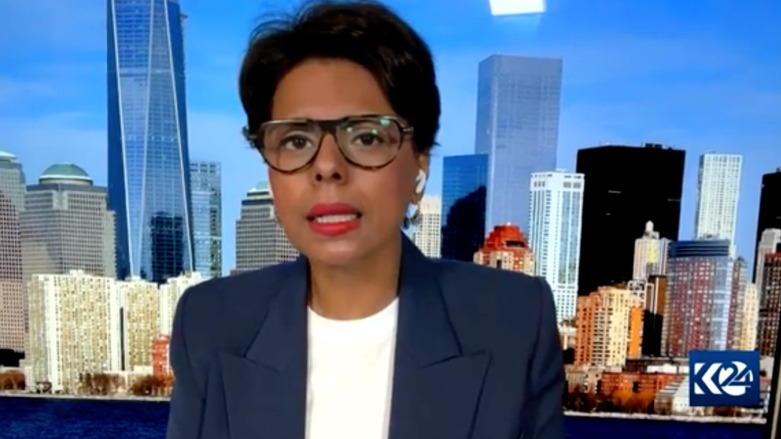British-American Physician: We are seeing the collapse of Iraq

ERBIL (Kurdistan 24) – We are seeing a very protracted, long collapse of an Iraq that has been completely neglected by the international authorities around the world, Qanta Ahmed, a physician, author, and rights activist warned in a recent interview with Kurdistan 24.
“Certainly, I'm very glad Saddam Hussein was toppled from power and certainly the best thing possible to happen in the Middle East was the no fly zone created in 1991, with Western authorities and President HW Bush.”
Read More: British-American Physician: No future for Iraq until there is an independent Kurdistan
“But since then, there has been a tremendous exploitation of the factions inside Iraq by external powers, but foremost is Iran,” she said.
“What we're seeing now is the most influential actor in Iraqi politics, Muqtada al-Sadr, who's able to mobilize the Iraqi street unlike anybody else, who has even though he is a Shia cleric and an Arab, one of the most distinguished Shia legacies, in Iraqi history, has now decided Iraq must not be influenced by either Iran or the United States.”
She said this is leading to chaos.
Sadr’s supporters took to the streets in the last few days to protest the Coordination Framework's nomination of Mohammad Shia' Al-Sudani for prime minister, an ally of former Iraqi PM Nouri al-Maliki.
Sadr and his Kurdish and Sunni allies failed earlier to jointly form a government after Sadr decisively won the Iraqi elections in October.
Now the Iran-aligned Coordination Framework is trying to form a government with or without Sadr. On Monday, Coordination Framework took the streets in a counter-protest, but so far this did not lead to clashes between supporters of Sadr and the Coordination Framework.
Kurdistan Region President Nechirvan Barzani expressed his support on Tuesday for Iraqi Prime Minister Mustafa Al-Kadhimi's initiative to hold a dialogue among all Iraqi parties.
Read More: Kurdistan Region supports PM Kadhimi's proposal for 'national dialogue': President Nechirvan Barzani
“(He (Sadr) did win and dominate the elections at the end of last year, and I think the greatest stakeholders were the Kurdish politicians, but they are not allowed to govern peacefully," Ahmed added.
Looking forward to joining @kurdistan24tv on Iran’s undeniable interference with Iraq; PM Masrour Barzani’s fascinating speech @ChathamHouse & the incoherent US Middle East policies as Europe deepens into conflict @K24English pic.twitter.com/e5Y8zPQAo6
— Qanta Ahmed (@MissDiagnosis) July 31, 2022
In this regard, she said the Kurdistan Region's “Prime Minister Masrour Barzani made an absolutely compelling speech at Chatham House in London in April, speaking about trying to mend this broken system to a new model of government."
She said he proposed changing Iraq to a”confederacy of states that had proper representation and could make real alliances together to protect Iraq inside and Iraqi borders externally.”
She said the PM Masrour Barzani’s idea to make Iraq a confederacy is also “a direct challenge to the United States which has been patronizing the Kurdish people and say that they believe only in one federal Iraq, and central government through Baghdad, which has failed dismally.”
PM Masrour Barzani in a speech on April 20 at the Chatham House in London, UK, proposed to make Iraq a confederal state.
“Erbil and Baghdad need to think about new arrangements. With its long history of centralism, Baghdad never fully embraced that the existing constitution makes the KRG the ultimate authority within Kurdistan on most matters,” PM Barzani said.
Read More: Decision-making in Baghdad not ‘truly independent’: PM Barzani
“Iraq’s new Constitution is described as federal but in fact already has many elements of a Confederation. Let us move to make it explicit; instead of conflict in which one entity tries to coerce the other, let’s become equal partners,” Barzani underlined.
Qanta Ahmed warned that “if there is no unifying center of power in Iraq, in a new form, then I think we do have an Iraq that is doomed to split into three states.”
She underlined that the Kurds “are the most persecuted people in humanity” who suffered seven centuries of persecution. “They have their own language, and culture, but they have never been given statehood.”
“They are completely persecuted people in Turkey, in Syria, in Iran and even being persecuted inside Iraq."
She warned that there if there is a "loss of a central focus for Iraq as a people, and the Iraqi people agree that we can have no unified form of government, then we no longer have a federal Iraq, then we are going to devolve into fragments, and that that could be explosive at a time when Turkey is beginning to prosecute more and more of its obsession, its war against Kurds.”
